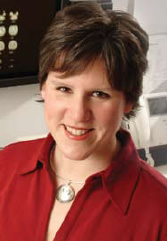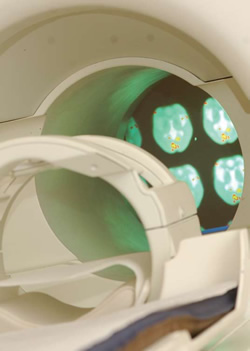Looking at the Working Brain
May 3, 2010
Neuroscientist Layne Kalbfleisch is interested in the developing brain—from childhood through old age. Now, new technology at the Krasnow Institute for Advanced Study at Mason will help her see differences in brain development as she compares children with attention deficit hyperactivity disorder or those who are intellectually gifted with those of average intelligence, and subjects with Alzheimer's disease with subjects without the disease.

Layne Kalbfleisch
Pomata Term Professor
Cognitive Neuroscience
Krasnow Institute is home to many scientists such as Kalbfleisch who are interested in different aspects of cognition, not only to gain general understanding, but also to improve people's lives. Now they have a new tool: a powerful $1.8 million Siemens Magnetom Allegra 3 Tesla brain scanner that provides a real-time look into the brain as it is functioning. With this technology, when a subject works to solve an intellectual task, researchers can see parts of the brain glow and fade similar to lights being switched on and off in different rooms of a house.
The technology at work is fMRI, functional magnetic resonance imaging. Safe and noninvasive, fMRI measures the rapid changes that occur in an active part of the brain. Normally, fMRI labs are affiliated with medical centers, but Mason is one of only three nonmedical schools in the country with its own scanner, joining Princeton and Dartmouth Universities.
Kalbfleisch directs the science governing board of the fMRI facility with Professor Kevin McCabe, an expert in neuroeconomics. Both came to Mason well prepared to conduct research using fMRI technology. Kalbfleisch has had previous experience with start-up fMRI facilities at Georgetown University Medical Center and Weill Medical College of Cornell University, while McCabe first began using fMRI for experimental economics at the University of Arizona in 1998.
Using fMRI, Kalbfleisch has been examining the brain activities of children using a series of nonverbal behavioral exercises she devised that are based on the Naglieri Nonverbal Ability Test, which was developed by Mason psychology professor Jack A. Naglieri. Because the test is not language based, she is able to test young children, as well as subjects who speak different languages, a boon for her planned collaboration with Danish and Dutch researchers to study environmental influences on structural brain development.
In her current experiments, the subject will lie prone with his or her head within the scanner. A projection screen will display a task to be performed, and the scanner will record changing images of the brain as the subject works out the problem.
candles We'll be able to see the trade-off in brain real estate— certain areas people will and won't use to solve problems,candles Kalbfleisch says.
As the Pomata Term Professor of Cognitive Neuroscience who is also affiliated with Mason's College of Education and Human Development, Kalbfleisch has had private funding to prepare the groundwork for her experiments. She sees the long-term results of her research having implications for health care—possibly allowing doctors to identify diseases earlier and pharmaceutical companies to develop better drugs for brain disorders, possibly with the potential to even block a disease.
McCabe, who joined Mason in 2001 with Nobel Prize winner Vernon Smith at the Interdisciplinary Center for Economic Science, uses neuroeconomics, experimental economics, and behavioral economics to study questions in the emergence of rules of order, market design, industrial organization, game theory, monetary theory, and individual choice. Director of the Center for the Study of Neuroeconomics at Krasnow, he has been a principal investigator on many National Science Foundation grants and projects supported by the International Foundation for Research in Experimental Economics and Mason's Mercatus Center, where he holds a joint appointment.

Krasnow's new Siemens scanner
candles I think there's a growing belief that if we don't get to the biological foundations of economic behavior so that we understand the mechanisms producing that behavior, then we can't make good policy,candles he says in explaining how he came to neuroeconomics. candles We have to understand how the brain works before we can understand how people are influenced by various policy measures.candles
One aspect of McCabe's research is how people evaluate costs with respect to rewards.
candles That's probably critical for understanding why people so easily get into credit card debt and such issues as why people have trouble saving and why Social Security is such a hot-button issue,candles McCabe says. McCabe's first experiments with the new scanner explore such issues as incentives in the workplace, record keeping in the brain as it relates to trust relationships, and management styles.
candles My personal belief is that one thing we're going to find out—mainly because we're already finding it out—is that there is no single cognitive approach to the world,candles McCabe says. candles Some of those differences are evolved, and some are developmental, working off of evolutionary pathways. Once you assume that there can be differences in cognition, it means you can't write a general policy for the world.candles
A tantalizing thought for Kalbfleisch is that the fMRI studies might provide clues to human intelligence and creativity.
candles Are gifted people that way because they think fast or because they reason well?candles Kalbfleisch asks. candles What are the conditions of the brain when it's innovating? These are some of the big historical questions.candles
—Robin Herron
